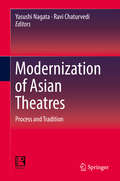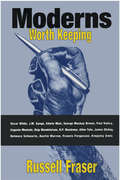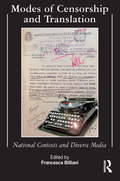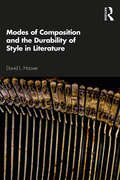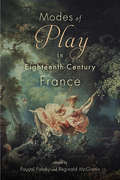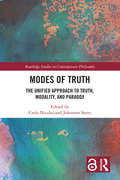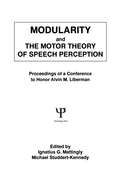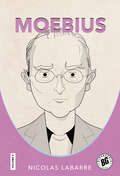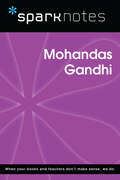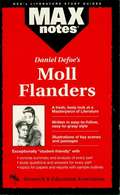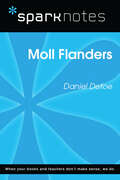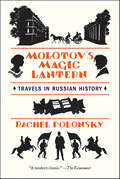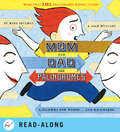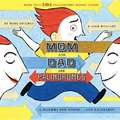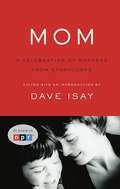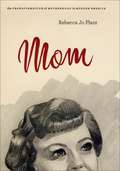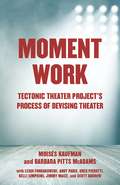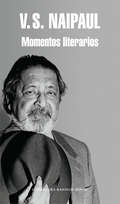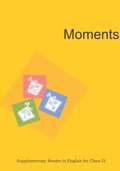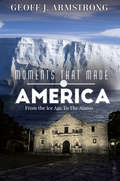- Table View
- List View
Modernization of Asian Theatres: Process and Tradition
by Yasushi Nagata Ravi ChaturvediThis volume focuses on the theatre history of Asian countries, and discusses the specific context of theatre modernization in Asia. While Asian theatre is one of the primary interests within theatre scholarship in the world today, knowledge of Asian theatre history is very limited and often surprisingly incorrect. Therefore, this volume addresses a major gap in contemporary theatre studies. The volume discusses the conflict between tradition and modernity in theatre, suggesting that the problems of modernity are closely related to the idea of tradition. Although Asian countries preserved the traditional form and values of their respective theatres, they had to also confront the newly introduced values or mechanisms of European modernity. Several papers in this volume therefore provide critical surveys of the history of theatre modernization in Asian countries or regions—Japan, Korea, Taiwan, Hong Kong, India Malaysia, Singapore, and Uyghur. Other papers focus on specific case studies of the history of modernization, discussing contemporary Taiwanese performances, translations of modern French comedy into Chinese, the modernization of Chinese Xiqu, modern Okinawan plays, Malaysian traditional performances, Korean national theatre, and Japanese plays during World War II. Renowned academics and theatre critics have contributed to this volume, making it a valuable resource for researchers and students of theatre studies, literature, and cultural studies.
Moderns Worth Keeping
by Russell FraserIn this new volume, Russell Fraser assembles fourteen twentieth-century writers he judges "worth keeping." All were famous in their time, but many outlived it, enduring an eclipse that Fraser intends this book to dispel. Each of the authors differs in background and in the kinds of writing practiced, and while together they do not constitute a modern canon, Fraser persuasively presents them as a group distinguished by a more than ordinary affiliation for language. Leading off are Oscar Wilde and J. M. Synge, both of whom were Irish and principally known as playwrights. The Scottish poets Edwin Muir and G.M. Brown are complemented by three great Europeans: Paul Valery, Eugenio Montale, and Osip Mandelstam, "mandarins" who wrote for an elite of their time, not a social elite, but readers who could read. The New Critics, who gave language first place in their writing, loom large in this account. R.P. Blackmur and Allen Tate are followed by Delmore Schwartz, Austin Warren, and Francis Fergusson, lesser stars orbiting those greater than themselves. Kingsley Amis the novelist and James Dickey the poet, with whom the book concludes, had a great run at fame and fortune, but ended bleakly. The world was livelier for these writers' presence, and what they left us still gives satisfaction. This heterogeneous group may be said to be our saving remnant. In a time of coarsened feeling, its members possess in high degree the ability to discriminate, seeing acutely, and inspiring feeling where it was dead. Their function is therapeutic, even restorative for the life of letters. To give them a hearing is the principal purpose of the book.
Modes of Censorship: National Contexts and Diverse Media
by Francesca BillianiModes of Censorship and Translation articulates a variety of scholarly and disciplinary perspectives and offers the reader access to the widening cultural debate on translation and censorship, including cross-national forms of cultural fertilization. It is a study of censorship and its patterns of operation across a range of disciplinary settings, from media to cultural and literary studies, engaging with often neglected genres and media such as radio, cinema and theatre. Adopting an interdisciplinary and transnational approach and bringing together contributions based on primary research which often draws on unpublished archival material, the volume analyzes the multi-faceted relationship between censorship and translation in different national contexts, including Italy, Spain, Great Britain, Greece, Nazi Germany and the GDR, focusing on the political, ideological and aesthetic implications of censorship, as well as the hermeneutic play fostered by any translational act. By offering innovative methodological interpretations and stimulating case studies, it proposes new readings of the operational modes of both censorship and translation. The essays gathered here challenge current notions of the accessibility of culture, whether in overtly ideological and politically repressive contexts, or in seemingly 'neutral' cultural scenarios.
Modes of Composition and the Durability of Style in Literature
by David L. HooverModes of Composition and the Durability of Style employs the tools and methods of computational stylistics to show that style is extremely resistant to changes in how texts are produced. Addressing an array of canonical writers, including William Faulkner, Joseph Conrad, Thomas Hardy, and Henry James, along with popular contemporary writers like Stephen King and Ian McEwan, this volume presents a systematic study of changes in mode of composition and writing technologies. Computational analysis of texts produced in multiple circumstances of composition, such as dictation, handwriting, typewriting, word processing, and translation, reveals the extraordinary durability of authorial style. Modes of Composition and the Durability of Style in Literature will be essential for readers interested in exploring the rapidly expanding field of digital approaches to literature.
Modes of Play in Eighteenth-Century France (Scènes francophones: Studies in French and Francophone Theater)
by Yann Robert Rori Bloom Jean-Alexandre Perras Zeina Hakim Masano Yamashita Erika Mandarino Katharine Hargrave Maria Teodora Comsa Annelle Curulla Jeffrey M. LeichmanCollecting diverse critical perspectives on the topic of play—from dolls, bilboquets, and lotteries, to writing itself—this volume offers new insights into how play was used to represent and reimagine the world in eighteenth-century France. In documenting various modes of play, contributors theorize its relation to law, religion, politics, and economics. Equally important was the role of “play” in plays, and the function of theatrical performance in mirroring, and often contesting, our place in the universe. These essays remind us that the spirit of play was very much alive during the “Age of Reason,” providing ways for its practitioners to consider more “serious” themes such as free will and determinism, illusions and equivocations, or chance and inequality. Standing at the intersection of multiple intellectual avenues, this is the first comprehensive study in English devoted to the different guises of play in Enlightenment France, certain to interest curious readers across disciplinary backgrounds.
Modes of Truth: The Unified Approach to Truth, Modality, and Paradox (Routledge Studies in Contemporary Philosophy)
by Carlo Nicolai; Johannes SternThe aim of this volume is to open up new perspectives and to raise new research questions about a unified approach to truth, modalities, and propositional attitudes. The volume’s essays are grouped thematically around different research questions. The first theme concerns the tension between the theoretical role of the truth predicate in semantics and its expressive function in language. The second theme of the volume concerns the interaction of truth with modal and doxastic notions. The third theme covers higher-order solutions to the semantic and modal paradoxes, providing an alternative to first-order solutions embraced in the first two themes. This book will be of interest to researchers working in epistemology, logic, philosophy of logic, philosophy of language, philosophy of mathematics, and semantics.
Modification
by Marcin MorzyckiModifiers and modification have been a major focus of inquiry for as long as the formal study of semantics has existed, and remain at the heart of major theoretical debates in the field. Modification offers comprehensive coverage of a wide range of topics, including vagueness and gradability, comparatives and degree constructions, the lexical semantics of adjectives and adverbs, crosscategorial regularities, and the relation between meaning and syntactic category. Morzycki guides the reader through the varied and sometimes mysterious phenomena surrounding modification and the ideas that have been proposed to account for them. Presenting disparate approaches in a consistent analytical framework, this accessibly written work, which includes an extensive glossary of technical terms, is essential reading for researchers and students of all levels in linguistics, the philosophy of language and psycholinguistics.
Modularity and the Motor theory of Speech Perception: Proceedings of A Conference To Honor Alvin M. Liberman
by Michael Studdert-Kennedy Ignatius G. MattinglyA compilation of the proceedings of a conference held to honor Alvin M. Liberman for his outstanding contributions to research in speech perception, this volume deals with two closely related and controversial proposals for which Liberman and his colleagues at Haskins Laboratories have argued forcefully over the past 35 years. The first is that articulatory gestures are the units not only of speech production but also of speech perception; the second is that speech production and perception are not cognitive processes, but rather functions of a special mechanism. This book explores the implications of these proposals not only for speech production and speech perception, but for the neurophysiology of language, language acquisition, higher-level linguistic processing, the visual perception of phonetic gestures, the production and perception of sign language, the reading process, and learning to read. The contributors to this volume include linguists, psycholinguists, speech scientists, neurophysiologists, and ethologists. Liberman himself responds in the final chapter.
Moebius (Biographix)
by Nicolas LabarreJean Giraud (1938–2012) started drawing comics in the late 1950s for a variety of French comics magazines. Under his real name, he found success in 1963 with the western series Blueberry, written by Jean-Michel Charlier and published in Pilote magazine. In the 1970s, he started producing science fiction works under the name of Moebius, which brought him international success, and which included works such as Arzach. He died in 2012 as a global celebrity in the comics world and a major influence across visual media. This first book-length, English-language study of Moebius finally brings international attention to an artist whose influence on the medium was profound and immediate, making him a role model for aspiring comics creators throughout his career. He was widely imitated while at Métal Hurlant in the 1970s, was “prominent among the spiritual fathers of the comic book rebels” in the 1990s, and again an example for the independent artists identified as the “new bande dessinée” in France in the early 2000s. Featuring close readings of key texts, including Blueberry, The Airtight Garage of Jerry Cornelius, and “The Long Tomorrow,” this volume examines Moebius’s style and aesthetic achievement. Notably, the volume explores the tension between Giraud and Moebius—one name for westerns, the other for science fiction; one name for the domestic market, another as a global brand; one name for the brush, another for the pen; one for the mainstream and the other for the underground. Nicolas Labarre challenges those dichotomies, especially in the later phases of Moebius’s career, unveiling the complex evolution of this understudied but influential artist.
Mohandas Gandhi (SparkNotes Biography Guide)
by SparkNotesMohandas Gandhi (SparkNotes Biography Guide) Making the reading experience fun! SparkNotes Biography Guides examine the lives of historical luminaries, from Alexander the Great to Virginia Woolf. Each biography guide includes:An examination of the historical context in which the person lived A summary of the person&’s life and achievements A glossary of important terms, people, and events An in-depth look at the key epochs in the person&’s career Study questions and essay topics A review test Suggestions for further reading Whether you&’re a student of history or just a student cramming for a history exam, SparkNotes Biography guides are a reliable, thorough, and readable resource.
Moll Flanders (MAXNotes Literature Guides)
by Susan GallagherREA's MAXnotes for Daniel Defoe's Moll Flanders MAXnotes offer a fresh look at masterpieces of literature, presented in a lively and interesting fashion. Written by literary experts who currently teach the subject, MAXnotes will enhance your understanding and enjoyment of the work. MAXnotes are designed to stimulate independent thought about the literary work by raising various issues and thought-provoking ideas and questions. MAXnotes cover the essentials of what one should know about each work, including an overall summary, character lists, an explanation and discussion of the plot, the work's historical context, illustrations to convey the mood of the work, and a biography of the author. Each chapter is individually summarized and analyzed, and has study questions and answers.
Moll Flanders (SparkNotes Literature Guide Series)
by SparkNotesMoll Flanders (SparkNotes Literature Guide) by Daniel Defoe Making the reading experience fun! Created by Harvard students for students everywhere, SparkNotes is a new breed of study guide: smarter, better, faster. Geared to what today's students need to know, SparkNotes provides: *Chapter-by-chapter analysis *Explanations of key themes, motifs, and symbols *A review quiz and essay topicsLively and accessible, these guides are perfect for late-night studying and writing papers
Molotov's Magic Lantern: Travels in Russian History
by Rachel PolonskyWhen the British journalist Rachel Polonsky moves to Moscow, she discovers an apartment on Romanov Street that was once home to the Soviet elite. One of the most infamous neighbors was the ruthless apparatchik Vyacheslav Molotov, a henchman for Stalin who was a participant in the collectivizations and the Great Purge—and also an ardent bibliophile. In what was formerly Molotov's apartment, Polonsky uncovers an extensive library and an old magic lantern—two things that lead her on an extraordinary journey throughout Russia and ultimately renew her vision of the country and its people.In Molotov's Magic Lantern, Polonsky visits the haunted cities and vivid landscapes of the books from Molotov's library: works by Chekhov, Dostoevsky, Pushkin, Akhmatova, and others, some of whom were sent to the Gulag by the very man who collected their books. With exceptional insight and beautiful prose, Polonsky writes about the longings and aspirations of these Russian writers and others in the course of her travels from the Arctic to Siberia and from the forests around Moscow to the vast steppes. A singular homage to Russian history and culture, Molotov's Magic Lantern evokes the spirit of the great artists and the haunted past of a country ravaged by war, famine, and totalitarianism.
Mom and Dad Are Palindromes
by Mark Shulman Adam McCauleyBob has a problem. He's a palindrome. In fact, once he learns what a palindrome is, he starts finding palindromes everywhere: his little sis, Nan; his pup, Otto; even his Mom and Dad! It's making Bobfeel like a kook. Is there no escape? Mark Shulman and Adam McCauley have joined forces to create a wonderfully visual, ridiculously clever book of wordplay. Join the hilarity. . . do your civic deed, don't let your pupils slip up, and find the over 101 palindromes hiding in the words and pictures of this zany book. Plus, this is the fixed format version, which will look almost identical to the print version. Additionally for devices that support audio, this ebook includes a read-along setting.
Mom and Dad Are Palindromes
by Adam Mccauley Mark ShulmanBob has a problem. He's a palindrome. In fact, once he learns what a palindrome is, he starts finding palindromes everywhere: his little sis, Nan; his pup, Otto; even his Mom and Dad! It's making Bobfeel like a kook. Is there no escape? Mark Shulman and Adam McCauley have joined forces to create a wonderfully visual, ridiculously clever book of wordplay. Join the hilarity. . . do your civic deed, don't let your pupils slip up, and find the over 101 palindromes hiding in the words and pictures of this zany book.
Mom, Mom, My Ears Are Growing!
by Betsy ByarsThis book sets up a reading program that encourages daily reading at home, giving parents specific tasks and strategies they can use to support their children, differentiated by reading level, with full accountability for the teacher and incentives for the students.
Mom: A Celebration of Mothers from StoryCorps
by Dave IsayIsay--StoryCorp's founder and the editor of the project's bestselling collection, "Listening Is an Act of Love"--presents a celebration of American mothers. "Mom" offers powerful lessons in the meaning of family and the expansiveness of the human heart.
Mom: The Transformation of Motherhood in Modern America
by Rebecca Jo PlantMom vividly brings to life the varied groups that challenged older ideals of motherhood, including male critics who railed against female moral authority, psychological experts who hoped to expand their influence, and women who wished to be defined as more than wives and mothers.
Moment Work: Tectonic Theater Project's Process of Devising Theater
by Moises Kaufman Barbara Pitts McAdamsA detailed guide to the collaborative method developed by the acclaimed creators of The Laramie Project and Gross Indecency--destined to become a classic. A Vintage Original.By Moisés Kaufman and Barbara Pitts McAdams with Leigh Fondakowski, Andy Paris, Greg Pierotti, Kelli Simpkins, Jimmy Maize, and Scott Barrow. For more than two decades, the members of Tectonic Theater Project have been rigorously experimenting with the process of theatrical creation. Here they set forth a detailed manual of their devising method and a thorough chronicle of how they wrote some of their best-known works. This book is for all theater artists—actors, writers, designers, and directors—who wish to create work that embraces the unbridled potential of the stage.
Momentos literarios
by V.S. NaipaulMomentos literarios es una biografía intelectual del premio Nobel de Literatura. En estos once textos, reunidos por primera vez en este volumen, el premio Nobel de Literatura abarca cerca de más de medio siglo de exploración personal en torno a los enigmas de la expresión escrita y de la narrativa en particular. Aquí se encuentran reflexiones acerca de sus lecturas de niño y sus primeros intentos de escribir durante la adolescencia; las primeras ilusiones y sus ideas sobre la relación que hay entre algunas formas literarias y algunas culturas. También se incluye en este volumen el famoso ensayo de Naipaul sobre su antepasado putativo literario Conrad y el prefacio, menos conocido y más enigmático, al único libro publicado por su padre. Finalmente, el lector encontrará su célebre discurso del Nobel, «Dos mundos», donde Naipaul reflexiona sobre el propósito de su carrera. Con su habitual maestría de expresión y su finura de pensamiento, Momentos literarios es una biografía intelectual del premio Nobel de Literatura y a la vez una colección de ensayos sobre el placer de leer, el arte de la escritura y la identidad del escritor.
Moments - Supplementary reader class 9 - Himachal Pradesh Board
by Himachal Pradesh Board of School Education Dharamshala"MOMENTS," a supplementary reader for Class IX by the Himachal Board of Education in collaboration with NCERT, intricately weaves diverse narratives that explore themes of friendship, resilience, and human relationships. Each story, crafted with meticulous attention, invites readers to empathize with characters and reflect on personal experiences. From the poignant journey of self-discovery in "The Lost Child" to tales of courage like "The Beggar," the book offers a rich literary landscape. Through engaging storytelling and profound insights, "MOMENTS" captivates its audience, leaving a lasting impression on readers of all ages. It explores the complexities of life with depth and sensitivity, encouraging readers to ponder on universal truths and the enduring power of human emotions.
Moments Supplementary Reader class 9 - JCERT
by Jharkhand Council of Educational Research and Training Ranchi"Moments: Supplementary Reader in English for Class IX" is a collection of various short stories aimed at enhancing the reading experience of adolescents by exposing them to themes like mystery, adventure, humor, courage, and more. It contains selected works by renowned authors like Mulk Raj Anand, Ruskin Bond, and Oscar Wilde, among others. Each story is accompanied by discussion prompts and activities designed to develop critical thinking, foster discussions, and stimulate imaginative engagement. The book is part of an educational initiative by the Jharkhand Council of Educational Research and Training (JCERT), aligned with the National Curriculum Framework.
Moments Supplementary Reader class 9 - NCERT - 23
by National Council of Educational Research and Training"MOMENTS," a supplementary reader in English for Class IX by NCERT, intricately weaves together a tapestry of diverse narratives that explore the human condition. Through a collection of stories ranging from heartwarming to thought-provoking, the book delves into various themes such as friendship, resilience, and the complexities of human relationships. Each story is crafted with meticulous attention to detail, inviting readers to empathize with the characters and reflect on their own experiences. From the poignant tale of a boy's journey to self-discovery in "The Lost Child" to the inspiring narrative of courage and sacrifice in "The Beggar," the book offers a rich literary landscape that resonates with readers of all ages. Through its engaging storytelling and profound insights, "MOMENTS" captivates its audience, leaving a lasting impression long after the final page is turned.
Moments That Made America: From The Ice Age To The Alamo
by Geoff J. ArmstrongThere is something totally appropriate about the fact that North America, the continent that would someday contain the United States, was born in a cataclysm so violent, it ripped apart a gigantic super continent. A little more than two hundred million years ago, the continent we know as North America did not exist. From space, our planet looked nothing like earth of the 21st century. At that distant time in our planet’s history, all the continents that exist today were joined together into one giant landmass scientists call “Pangaea”. Then, on the 4th of July, 200,000,000 BCE (Before the Common Era) an immense earthquake hammered Pangaea. From the extreme northernmost point to the southern end, a deep fault in the earth split open and a huge chunk of Pangaea began to separate from the rest of the supercontinent. At first, the separation was only a few inches, but North America was born at that moment. A small piece of the scar from that cataclysm can be seen in a 20-mile line of cliffs called the Hudson River Palisades that run along the west side of the lower Hudson River near New York City.The date is highly imaginary of course. With no humans around to invent calendars, we can’t possibly know the exact date North America was born, but that date fits perfectly. This book focuses on all those incredible pivotal moments in all those thousands of years that followed that made North America and give the world the United States.
